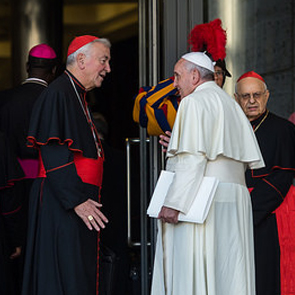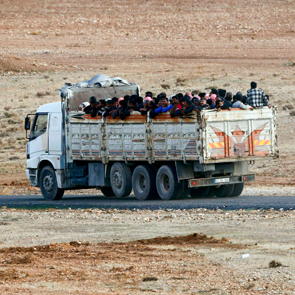On Monday Pope Francis expanded the agenda of a consistory on the causes of saints – including that of Goa native and evangeliser of Sri Lanka, Blessed Joseph Vaz - to include discussion of the ongoing crisis in the Middle East.
“We cannot resign ourselves to imagining a Middle East without Christians, who have professed the name of Jesus there for over 2,000 years,” the Pope told cardinals and patriarchs with responsibility for the region. “We would like to give all the help possible to Christian communities to support them in remaining there.”
In Iraq and Syria, the Pope said, “We are witnessing a phenomenon of terrorism on an unimaginable scale … It seems that an awareness of the value of human life has been lost; it is as if people do not count and can be sacrificed to other interests. And unfortunately all this encounters indifference on the part of many”. “This unjust situation requires, aside from our constant prayer, an adequate response on the part of the international community.”
The centrepiece of the discussion that followed was an address by the Secretary of State of the Holy See, Cardinal Pietro Parolin, in which he presented a summary of the meeting of Apostolic Nuncios to the countries of the region that took place at the beginning of October.
On the question of the use of force to halt aggression and to protect Christians and other groups who are victims of persecution, Cardinal Parolin said: “In this regard, it was stressed repeatedly that it is licit to stop the unjust aggressor – always, however, in a manner consistent with international law, as the Holy Father has also affirmed.”
Speaking specifically of the threat posed by the self-styled Islamic State, Cardinal Parolin said, “Attention must be paid to the sources that sustain [its] terrorist activities through more-or-less clear political support, as well as through illegal commerce in oil and the supply of weapons and technology.”
A basic regional problem, he said, was “a lack of separation between religion and State, between the religious sphere and the civil sphere – a tie that makes life difficult for non-Muslim minorities and in particular for the Christian minority. It would be important, therefore, to help nurture the notion of the distinction of these two spheres in the Muslim world.”
“The United Nations and the structures that exist for [addressing] similar emergencies, must act to prevent possible new genocides and to assist the numerous refugees,” Cardinal Parolin insisted.
Meanwhile the Deputy President of the Iranian Bishops’ Conference, Chaldean Catholic Archbishop Thomas Meram of Urmya, said a Middle East without its Christians would be like a garden without flowers. He was speaking after a visit to Jordan last week as one of six Orthodox and Catholic eastern rite church leaders.
King Abdullah expressed his solidarity with the region’s Christians, Archbishop Meram said, stressing that the hatred, terrorism and fanaticism spread by extremist groups have nothing to do with the values of the three monotheistic religions.
Above: Thousands have fled their homes because of the threat from Islamic State jihadists. Many Christians have gone to the Nineveh Plains or Jordan while these Syrian Kurdish refugees have crossed into Turkey. Photo: CNS/Reuters




 Loading ...
Loading ...